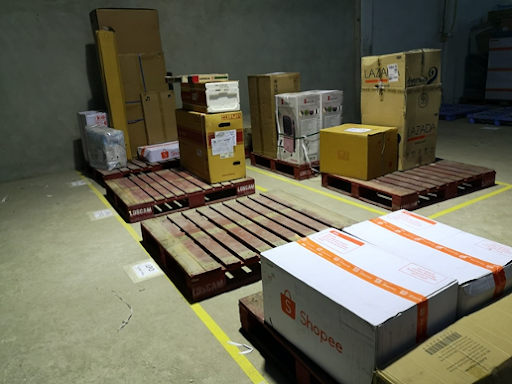Logistics and Marketing: Just how are they related? 🤔
You might be wondering, “why is an Operations Management major writing for a marketing magazine?”
While I’m an Operations Major by course, I keep myself plugged into marketing news and innovations to keep up with the developments of the digital space. I have always been interested in understanding how e-commerce retailers and marketplaces interact to engage consumers. I have also always been curious about learning how to run ad campaigns myself.
So imagine my surprise when I learnt about how closely related the two of them are in one of my internship stints. But before I elaborate more on this topic, let’s start with some basic definitions to get everyone on the same page.
Some basic definitions
What is logistics?
Logistics is the process in which resources are acquired, stored, and then transported to their intended destination. On time ⏰ (can’t emphasise this enough!).
Some of the more prominent businesses that come to mind when you think of logistics are Amazon, Shopee, Lazada, and Taobao.
What is marketing?
The textbook definition of marketing defines it as the process in which long term relationships are built between businesses and their customers. It is about finding out what customers need and then delivering and communicating your solution that to them. And this can be done in several ways:
Awareness campaigns are run to promote new product offerings
Detailed and helpful customer support articles are written to guide new users through setting up new software and troubleshooting issues
Using data analytics tools to see which ad campaign is performing better in order to determine the preferred marketing channel
What is logistics in marketing and/or vice versa?
If there’s one thing that overlaps the two business functions, is that they exist to make customers happy.
An efficient logistics process is needed to get products to your customers’ doorsteps on time. Good marketing is needed to communicate good value to your customers.
At their very core, both are important in the customer relationship management process.
So, how are logistics and marketing really related?
1) A strong logistics operation is needed to keep the brand promise
Here’s me (or my hand) in a Ninjavan warehouse in Thailand during my internship back in2018
I have had the opportunity to intern at Ninjavan (TH) Logistics where their main client is e-commerce marketplaces, Shopee and Banggood.com.
Ninjavan came into existence to primarily service the e-commerce industry as the logistics infrastructure at that point seemed to be failing. Ninjavan assures its customers that they will receive their products in good condition in a transparent and timely manner. This, is the brand promise (see where marketing comes in?).
This is an important point to note as the product journey involves the transition from digital marketing to logistic operations. Now that the marketing message has been put out, the logistics side of things needs to ensure that the promise is kept. Products must be delivered in good condition on time.
Any breakdown in the process would affect the customers, and in turn, the brand reputation directly.
2) Aggressive marketing help keep the logistics business alive
During my internship, I observed two Shopee campaigns namely 6.6 and 7.7. These were truly trying times for the warehouse and delivery riders as they had to work a little harder to clear the backlogs from these campaigns.
Shopee Thailand (TH) 4.4 Campaign Photo • SOURCE
The build-up of these campaigns is usually a strategic and elaborate one where marketplaces start to engage users through the use of targeted ads early. So in the days leading up to the campaigns, the frequency of in-app notifications and ads about discounts and promotions will start to increase exponentially.
Shopee is quite relentless about this. 😱
The volume of orders that comes into warehouses the day after campaigns is overwhelming. These large volumes of parcels have to be closely monitored and regulated as they travel down the supply chain. I can’t imagine the amount of profit that was made from the sales of these items.
3) Aggressive marketing tests businesses’ logistics operations
Here’s a snapshot of Shopee’s warehouse I took back in 2018.
The power of these campaigns is so great that it would be naive for marketplaces to not have logistical contingencies. The days after campaign volume arrived at warehouses, it was projected that it would take approximately 1.5 - 2 weeks for the last parcel to be delivered.
This would not be in accordance with the service level agreements (SLAs). As such, it would be understandable that Shopee contracts other last-mile 3rd Party Logistics (3PLs) like Ninjavan.
Shopee (TH) ran a ‘Harvest Season’ Campaign where they offered 10KG rice sacks at promotional prices 🍚 The campaign was successful enough to notably slow down delivery times due to the weight of the load - literally. I personally thought this was interesting as buying rice on Shopee is not common here in Singapore.
I have come to appreciate how marketing and logistics processes influence each other and how dynamic backend operations are able to support the successes of marketing campaigns - almost like a push and pull.
4) In turn, the results of said test then will influence your marketing strategies
After your logistics operations have been put to the test, you will have a better idea about whether or not you are capable of fulfilling your brand promises.
If there were too many items delivered late, you might want to tweak your marketing message to promise what you can actually deliver. When you put out a brand promise you can fulfil, you are able to improve customer satisfaction and build brand loyalty.
Closing words
I hope I have value-added one way or another.
As you can see, these business functions do not exist in silos. In fact, many business functions don’t as well. At the end of the day, a business exists to solve problems or address the needs of a demographic. The different departments have to collaborate to build long-term relationships with their customers.
Thank you markonmag for the opportunity to share my experiences with marketing students. markonmag is a great online marketing magazine guys! Go download it!



